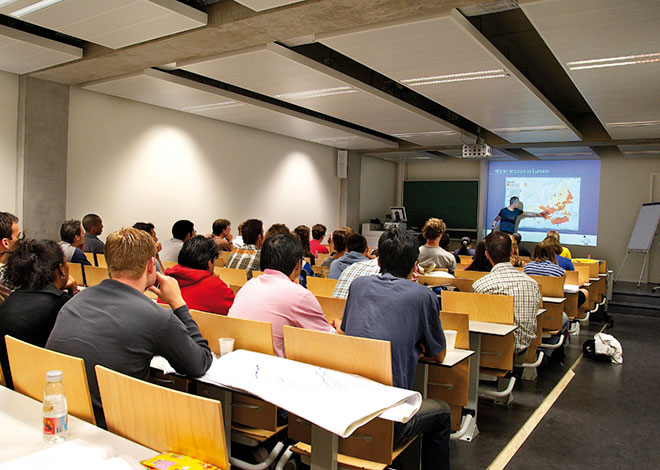Credits? What should you know as a student / parent?
Earning credits (ECTS) is important during a university degree programme. Your child will quickly start using these terms at home. But what are these credits?

More about credits
In this article, I will delve deeper into the structure of higher vocational education (HBO) and scientific research education (WO) and how many credits a student must obtain in order to complete an academic year and a degree programme. What is a credit (ECTS) “worth” and what does a student have to do for it? It is useful for you as the parent if you want to keep track of your child’s progress in the degree programme.
Credits – what are they?
You earn credits (ECTS) for each part of the degree programme that you complete. For instance, you earn credits for exams that you pass, work placement that you complete properly, or a project report. For each assignment that you earn a passing grade for, you receive credits.
The degree programme calculates how much time is spent on average to do a certain assignment or to read a certain book. For every 28 hours of work, you receive one ECTS. If the degree programme thinks it takes 28 hours to do an assignment properly, then you will receive 1 ECTS. If it takes 56 hours of self-study to pass an exam, then you receive 2 ECTS.
Sometimes, it is very easy for me to earn my credits, but other times, I have to study for a lot more hours than have been indicate. Who actually determines how much time I have to spend on a course?
For your report, you also receive a mark. That is how the quality is evaluated. Whether you obtain a 9 for your exam or a 6 is not relevant for the credits you earn. The 2 ECTS stay the same no matter whether you studied for that exam for 2×28=56 hours. The number of hours that you have to spend to complete a certain component can vary wildly. Some students can easily read big books, while others have a lot of difficulty with group work. The degree programme makes an estimate based on experience. Next, a quantity of credits is assigned to the course.
How many credits do you have to earn?
Each year that you study, you are expected to earn 60 credits. A complete HBO programme is 4×60 credits = 240. A WO Bachelor’s programme, which lasts three years, is 3×60 credits = 180. After a WO Bachelor’s, you will participate in a WO Master’s programme. A single-year Master’s is 60 credits and a two-year Master’s is 2×60 = 120. You need to have already earned the Bachelor’s credits before you can begin a Master’s programme. This is called the “harde knip” (Bachelor-before-Master rule). This “harde knip” is used by all universities. Some students who have completed an HBO Bachelor’s move on to a university Master’s afterwards.
Binding study recommendation
In the first year of study, the student must earn a certain quantity of credits. That is called the binding study recommendation. All universities have a binding study recommendation. Sometimes, a university requires 36 credits, but 45 or even 60 ECTS can also be required. This differs per degree programme and per institution. It is useful to thoroughly ask about this beforehand. Obtaining the binding study recommendation is important. If the student does not obtain the required number of credits, then they will have to leave the degree programme. However, the student must also try to find the right balance between studying and relaxing.
Study delay
If a student does obtain the number of credits required for their binding study recommendation, but not all 60 ECTS that are expected for the first year, then they can earn those credits later. For instance, the missing credits can be earned during the second or third year of study. That will typically result in a study delay. In that case, the student continues the degree programme longer than expected. This rule also applies for subsequent academic years. You can also earn the credits at a slower pace. Many students complete a three-year WO Bachelor’s programme in four years. HBO students often spend five years on their four-year Bachelor’s programmes. If your binding study recommendation is positive, you are permitted to study for longer. However, all credits must eventually be earned. There is also a maximum duration for this. After a certain amount of time has passed, the credits will expire. The “eternal student” no longer exists.
Why credits?
In Europe, this is the credit system that is used. It is also called ECTS, the European Credit Transfer System. This was introduced in order to make all diplomas in Europe of equal value. This is great for students who want to do part of their degree programme abroad.
I am becoming a researcher, but I also would like to be a lecturer. I can earn my teaching certification at a different university, so I am currently taking courses and earning credits.
If you have completed a WO Bachelor’s, you will participate in a WO Master’s programme. You can do that at your home university or switch to a different one. That is why the “harde knip” was put into place. This encourages the student to develop themselves in a broad way. It also keeps the student from running the risk that courses they missed in the first year still have to be completed in the Master’s phase. Therefore, first you earn all the ECTS for your Bachelor’s and only then do you earn credits for your Master’s

Do credits remain valid forever?
My daughter is in a nursing programme. She had to earn 60 ECTS in her first year. She fell just short of that. However, the same nursing programme in another city only requires 55 ECTS in the first year. Is that allowed? Can my daughter still switch?
A university is authorised to decide a lot of things. They can determine how long the credits are valid. Sometimes, that is five years and sometimes, it’s ten. There are significant differences. The period of validity for credits is limited for two reasons.
1. The educational institution wants to encourage the student to complete the degree programme within a reasonable amount of time.
2. The content of certain courses can change, e.g. because other requirements are set for the degree programme. An outdated credit no longer “covers the scope” of the degree programme. Sometimes, the student does not need to take the course again, but is required to complete a replacement assignment. This is all described in the regulations of the educational institution.
Transferring credits
Has your son or daughter come to the conclusion that they have made the wrong study choice? That is a real shame. However, sometimes, students are able to transfer the credits they have earned to a different study programme. This is easier to do at the same institution than when switching to a different institution. The student can ask for information about this from the study adviser or study development counsellor. Exemptions can also be made if you have acquired specific knowledge or skills in a previous degree programme, through volunteer work, or a job.
Why is it so strict?
The age of the “eternal student” is gone. Students are expected to work hard. It has to quickly become clear whether the student has found the right place to be. For this reason, there are especially high requirements set for the first academic year. If your son or daughter does not make it through the first year, that is a real shame. However, there can still start again without too much time wasted. If this happens during the second or third academic year instead, then that is far more serious.
Comparing degree programmes
Is your son or daughter not a student yet, but hard at work making a study choice? In this phase, it is extremely important to compare degree programmes. How many credits do you have to earn in the first year of study? Are there multiple resits? How much guidance and assistance do you receive? What is the quality of the degree programme? How satisfied are senior students?
Student responsibility
In a university-level programme, the student is entirely responsible for obtaining a sufficient number of credits. There is nobody to look over their shoulder and make sure they do the work. Have you noticed that your child is not doing so well? Encourage them to seek out help. The study adviser or the study development counsellor is the first point of contact for this.
Privacy of the student
Universities provide parents with no information into the number of credits obtained. This is related to the privacy of the student. However, I can explain how the system works. I can also provide tips if things are not going so smoothly. Please send me an e-mail hermien.miltenburg@wur.nl or make a Phone call +31317484455


Hi there
I live in South Africa and am a British national. As far as I understand I have the South African equivalent of the Dutch HBO. Would you be so kind as to refer me to an organisation I could look up to have my credits converted? I’d be so grateful.
Many thanks
If you want to compare your diploma with a Dutch equivalent, you can register yourself and ask for help at https://www.nuffic.nl/en/diploma-recognition/studying-in-holland-with-a-foreign-diploma.